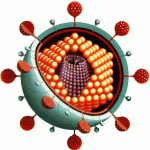Virology
|
4 march 2015 05:45:53 |
| RNA interference-based resistance in transgenic tomato plants against Tomato yellow leaf curl virus -Oman (TYLCV-OM) and its associated betasatellite (Virology Journal) |
|
Tweet Background:
Tomato yellow leaf curl virus (TYLCV), a monopartite begomovirus (family Geminiviridae) is responsible for heavy yield losses for tomato production around the globe. In Oman at least five distinct begomoviruses cause disease in tomato, including TYLCV. Unusually, TYLCV infections in Oman are sometimes associated with a betasatellite (Tomato leaf curl betasatellite [ToLCB]; a symptom modulating satellite). RNA interference (RNAi) can be used to develop resistance against begomoviruses at either the transcriptional or post-transcriptional levels.
Results:
A hairpin RNAi (hpRNAi) construct to express double-stranded RNA homologous to sequences of the intergenic region, coat protein gene, V2 gene and replication-associated gene of Tomato yellow leaf curl virus-Oman (TYLCV-OM) was produced. Initially, transient expression of the hpRNAi construct at the site of virus inoculation was shown to reduce the number of plants developing symptoms when inoculated with either TYLCV-OM or TYLCV-OM with ToLCB-OM to Nicotianabenthamiana or tomato. Solanumlycopersicum L. cv. Pusa Ruby was transformed with the hpRNAi construct and nine confirmed transgenic lines were obtained and challenged with TYLCV-OM and ToLCB-OM by Agrobacterium-mediated inoculation. For all but one line, for which all plants remained symptomless, inoculation with TYLCV-OM led to a proportion (≤25%) of tomato plants developing symptoms of infection. For inoculation with TYLCV-OM and ToLCB-OM all lines showed a proportion of plants (≤45%) symptomatic. However, for all infected transgenic plants the symptoms were milder and virus titre in plants was lower than in infected non-transgenic tomato plants.
Conclusions:
These results show that RNAi can be used to develop resistance against geminiviruses in tomato. The resistance in this case is not immunity but does reduce the severity of infections and virus titer. Also, the betasatellite may compromise resistance, increasing the proportion of plants which ultimately show symptoms. |
| 144 viewsCategory: Virology |
 Formononetin inhibits enterovirus 71 replication by regulating COX- 2/PGE 2 expression (Virology Journal) Formononetin inhibits enterovirus 71 replication by regulating COX- 2/PGE 2 expression (Virology Journal)BRCA1 functions as a novel transcriptional cofactor in HIV-1 infection (Virology Journal) 
|
| blog comments powered by Disqus |
MyJournals.org
The latest issues of all your favorite science journals on one page
The latest issues of all your favorite science journals on one page



